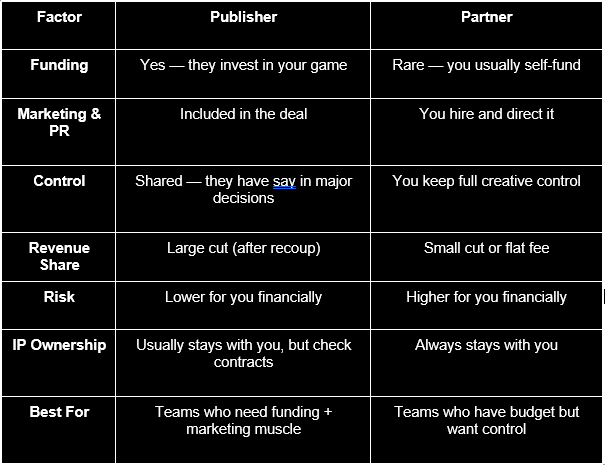Releasing a game is one of the most exciting—and nerve-wracking—milestones for any developer. After years of development, testing, and refining, you finally get to share your creation with the world.
But there’s a big decision to make before you get there: Should you work with a game publisher, or should you collaborate with a partner?
Both options can help your game succeed, but they operate in very different ways. Your choice will affect how much control you have, how profits are split, and even the way your game is presented to players.
In this post, we’ll break down exactly how each model works, the pros and cons of each, and what to look for before signing anything. By the end, you’ll have a clear understanding of which route is right for your game.
What Working With a Game Publisher Really Means
A game publisher is a company that funds, markets, and distributes games, often taking on a large portion of the financial risk. In exchange, they expect a significant share of the revenue, and sometimes they have a say in your game’s creative direction.
Think of them as a combination of investor, marketer, and distributor rolled into one. They bring resources and experience that can get your game in front of millions of players. But remember that support comes with conditions.
What Publishers Typically Offer
- Funding
Funding is one of the biggest draws of working with a publisher. They can cover:
- Full development costs
- Milestone payments to keep production running smoothly
- Marketing and PR budgets
- Post-launch updates or live service costs
For smaller studios or indie teams, this can be the difference between completing a game and shelving it due to lack of resources.
- Marketing and Promotion
Publishers have established marketing teams, PR contacts, and influencer relationships.
They can:
- Get your game featured in major gaming events or showcases
- Secure coverage from gaming press and content creators
- Run large-scale ad campaigns across social media, search, and gaming platforms
- Produce high-quality trailers, key art, and promotional materials
This saves you from having to learn and fund large-scale marketing campaigns yourself.
- Distribution and Platform Access
Publishers often have strong relationships with platforms like Steam, PlayStation, Xbox, and Nintendo. They can negotiate better placement on store pages, arrange platform-specific promotions, and speed up approval processes. - Production Support
From QA testing to localisation to certification, publishers can manage the time-consuming operational work that comes with launching a game in multiple regions.
How Revenue Sharing Works With Publishers
Publisher deals are usually based on a recoup-first model. Here’s how it works:
- Your game launches and starts earning money.
- The publisher first takes back the money they invested (funding, marketing, services).
- Once costs are recouped, profits are split between you and the publisher.
The split can vary:
- 50/50 is common after recoupment.
- Some publishers take as much as 60% or as little as 30% depending on the deal and their investment.
Example: If your game makes $2M gross on Steam:
- Platform fees (e.g., Steam’s 30%) reduce it to $1.4M net.
- Publisher recoups $900k in investment.
- Remaining $500k is split according to your deal. At 50/50, you’d get $250k.
Control and Decision-Making With Publishers
This is where many developers feel the pinch.
Publishers often have approval rights over:
- Release dates
- Major gameplay changes
- Pricing and discounts
- Marketing assets
While their input can help align your game with market trends, it can also mean compromising on elements you care deeply about.

How the Partner Model Works
A partner is a more flexible collaborator. They don’t take full control of your game or its launch. Instead, they provide targeted help in specific areas, while you remain in charge of the big picture.
This could mean hiring a marketing agency, contracting a porting studio, or working with a PR firm for launch coverage.
What Partners Typically Offer
Specialised Services
Partners focus on what they’re good at — marketing, community management, PR, localisation, distribution support — while you handle everything else.
Flexible Collaboration
You decide what you need and pay for just that. Need marketing but not funding? No problem. Need a publisher’s distribution reach but want to keep your marketing in-house? A partner can fill that role.
Full Creative Control
You keep all decision-making power. Partners execute your instructions but don’t have veto rights over your content, release date, or pricing.
How Revenue Sharing Works With Partners
Most partner arrangements are:
- Flat fees (e.g., paying $15k for a marketing campaign)
- Monthly retainers for ongoing services
- Small revenue shares (5–20%) if the partner takes on some financial risk
Because you’re the one paying, you also keep a larger share of profits — but this also means you carry more of the financial risk if sales underperform.
Publishers vs. Partners: The Core Trade-Offs
Here’s the heart of the decision:

Contract Red Flags to Watch Out For
Whether you choose a publisher or a partner, contracts are where good deals can go bad.
For Publishers:
- Recoupment Terms: Make sure costs are clearly defined — vague terms can let publishers charge for things you didn’t agree to.
- Approval Rights: Understand exactly which decisions they control.
- IP Ownership: Always confirm that your intellectual property stays with you.
- Termination Clauses: Know the conditions under which either party can end the deal.
For Partners:
- Scope of Work: Get precise descriptions of what’s included.
- Payment Structure: Avoid hidden costs or unclear billing cycles.
- Exclusivity Clauses: Make sure you can work with others if needed.
- Delivery Deadlines: Set clear timelines for services.

Questions to Ask Before Signing Any Deal



